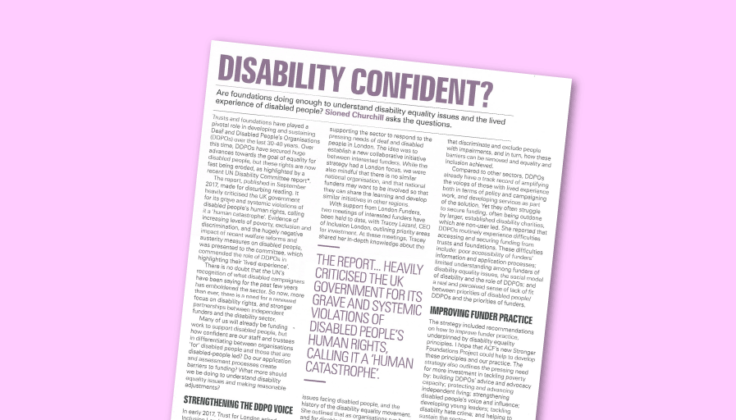Disability Confident? Article in Trust and Foundation news
Are foundations doing enough to understand disability equality issues and the lived experience of disabled people? Article by Sioned Churchill, Director of Special Initiatives and Evaluation at Trust for London, in Trusts and Foundations News.

Download the article in PDF form: DisabilityConfident_TrustsandFoundation
Trusts and foundations have played a pivotal role in developing and sustaining Deaf and Disabled People’s Organisations (DDPOs) over the last 30-40 years. Over this time. DDPOs have secured huge advances towards the goal of equality for disabled people, but these rights are now fast being eroded, as highlighted by a recent UN Disability Committee report*.
The report, published in September 2017, made for disturbing reading. It heavily criticised the UK government for its grave and systemic violations of disabled people’s human rights, calling it a ‘human catastrophe’. Evidence of increasing levels of poverty, exclusion and discrimination, and the hugely negative impact of recent welfare reforms and austerity measures on disabled people, was presented to the committee, which commended the role of DDPOs in highlighting their ‘lived experience’.
There is no doubt that the UN’s recognition of what disabled campaigners have been saying for the past few years has emboldened the sector. So now, more than ever, there is a need for a renewed focus on disability rights, and stronger partnerships between independent funders and the disability sector.
Many of us will already be funding work to support disabled people, but how confident are our staff and trustees in differentiating between organisations ‘for’ disabled people and those that are disabled-people led? Do our application and assessment processes create barriers to funding? What more should we be doing to understand disability equality issues and making reasonable adjustments?
Strengthening the DDPO Voice
In early 2017, Trust for London asked Inclusion London, the pan-London umbrella organisation for DDPOs, to develop a strategy for strengthening the voice of DDPOs in the capital. The purpose in suggesting a strategy was to have a clear sense of how independent funders could invest in DDPOs in a more co-ordinated way, with the aim of supporting the sector to respond to the pressing needs of deaf and disabled people in London. The idea was to establish a new collaborative initiative between interested funders. While the strategy had a London focus, we were also mindful that there is no similar national organisation, and that national funders may want to be involved so that they can share the learning and develop similar init iatives in other regions.
With support from London Funders, two meetings of interested funders have been held to date, with Tracey Lazard, CEO of Inclusion London, outlining priority areas for investment. At these meetings, Tracey shared her in-depth knowledge about the issues facing disabled people, and the history of the disability equality movement. She outlined that as organisations run by and for disabled people, DDPOs share a set of characteristics that bring the expertise, knowledge and understanding of being a disabled person to their work. They have led the way in shifting society’s understanding of disability (and disabled people) from a medical or charitable ‘frame’ to a social model of disability and human rights ‘frame’ that reveals how society creates and perpetuates barriers that discriminate and exclude people with impairments, and in turn, how these barriers can be removed and equality and inclusion achieved.
Compared to other sectors, DDPOs already have a track record of amplifying the voices of those with lived experience both in terms of policy and campaigning work, and developing services as part of the solution. Yet they often struggle to secure funding, of ten being outdone by larger, established disability charities, which are non-user led. She reported that DDPOs routinely experience difficulties accessing and securing funding from trusts and foundations. These difficulties include: poor accessibility of funders’ information and application processes; limited understanding among funders of disability equality issues, the social model of disability and the role of DDPOs; and a real and perceived sense of lack of fit between priorities of disabled people/DDPOs and the priorities of funders.
Improving Funder Practice
The strategy included recommendations on how to improve funder practice, underpinned by disability equality principles. I hope that ACF’s new Stronger F.oundations Project could help to develop these principles and our practice. The strategy also outlines the pressing need for more investment in tackling poverty by: building DDPOs’ advice and advocacy capacity; protecting and advancing independent living; strengthening disabled people’s voice and influence; developing young leaders; tackling disability hate crime; and helping to sustain the sector.
We would welcome the involvement of more funders in this work. For more information, contact sioned@trustforlondon.org.uk
* The UN report can be found at http://bit.ly/UN-DDPO
Sioned Churchill is Director of Special Initiatives and Evaluation, Trust for London.